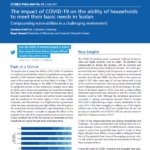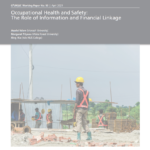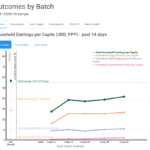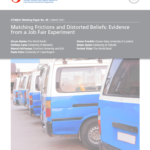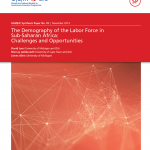G2LM|LIC proudly announces the launch of IZA/FCDO Online Development Economics Course for Sub-Saharan Africa. On 17th September, the course began with 1440 participants from 43 countries. Over a period of two months, the participants will be guided through a combination of recorded lectures and live sessions every week. The course is taught by Professors Oriana…
Uncategorized
The Impact of COVID-19 on the Ability of Households to Meet Their Basic Needs in Sudan: Compounding Vulnerabilities in a Challenging Environment
The COVID-19 pandemic poses a particular challenge for low-income and fragile countries, such as Sudan. A G2LM|LIC project assesses the effects of the COVID-19 pandemic on Sudanese households by means of a rapid phone survey administered to 2,400 randomly selected mobile phone users. This policy brief presents new findings from the Economic Research Forum’s COVID-19…
Occupational Health and Safety: The Role of Information and Financial Linkage
Small and Medium Enterprises (SMEs) play an important role in income and employment generation in local economies, and SMEs account for a large share of businesses in low and middle-income countries (LMICs). A field experiment in Bangladesh provides informal firms information on occupational health and safety (OHS). A sub-treatment arm provides firms with financial linkages…
The Kenya Life Panel Survey – COVID 19 Sample
The Kenya Life Panel Survey – COVID 19 Sample (KLPS) data visualization portal gives answers to queries relating to income, consumption, labor supply, food security, COVID-19 and mental health parameters. One can easily switch between viewing the entire sample characteristics, or navigate gender wise as well as between rural and urban sectors. This data visualization…
Matching Frictions and Distorted Beliefs: Evidence from a Job Fair Experiment
Job fairs have been one of the most explored paths to gain entry into the labor market by young entrants. Frictions are likely to be more prevalent in a rapidly growing urban center in a low-income setting. Our new Working Paper No. 49 reports its findings from Addis Ababa, the capital of Ethiopia. In this…
Thank you to all the mentors!
The special mentoring sessions of the IZA/FCDO Online Short Course on Research Skills for Sub-Saharan Africa received an overwhelming response! Out of 208 applicants, 40 researchers based in Sub-Saharan Africa were matched with mentors who are experienced researchers in their own field. We are happy with the extremely positive feedback: 95% of the mentees wish…
The Global Job Database to be launched soon
A new G2LM|LIC dataset is in preparation. The Global Jobs Database harmonises all available micro datasets that contain information on labour market activities and poverty to create a multi-country macro data-set that contains: LFP, occupational choices (sector, casual vs regular, wage vs self-employment), earnings, hours worked, seasonality all by gender, education, age groups and wealth.…
IZA/FCDO online short course was a big success
The IZA/FCDO online short course on research skills for Sub-Saharan Africa took place on 17 and 18 December 2020. The event was attended by 250 participants from 33 African countries. The course consisted of teaching videos and an online Q&A. The lectures covered several relevant topics for researchers and were given by Oriana Bandiera (London…
Call of Interest on COVID-19 in Low-Income Countries
The current COVID-19 pandemic has resulted in a global crisis with short- and long-term implications for health, the economy, and social relations. The negative impacts of the crisis are expected to be more pronounced in developing countries. Therefore, there is an urgent need for policymakers in these countries to monitor the extent of the spread…
The new GLMLIC synthesis report on the demography of the labor force in Sub-Saharan Africa is now available
The world is projected to add 3.1 billion people to the total population and 1.4 billion people to the working-age population between 2020 and 2100. Almost all of the additional working-age people will be added in Sub-Saharan Africa, a dramatic change from previous decades when the growth of the working-age population was concentrated in Asia.…
